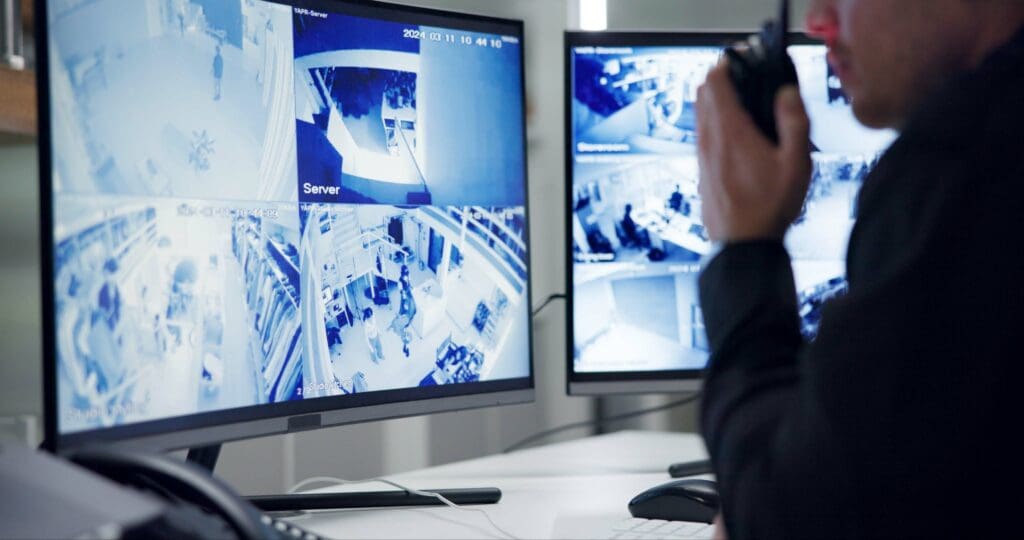Why Protection is an Investment, Not an Expense
When business owners evaluate security measures, the conversation often starts with cost. “How much will this set us back?” But the more important question is: “How much will inadequate security cost us?” The return on investment (ROI) for business security is often substantial, measurable, and immediate, yet many companies only realize this after experiencing a significant loss.
Security ROI: Beyond the Numbers
Security ROI isn’t just about preventing dramatic break-ins or major theft (though those matter too). It’s about the cumulative impact of protection across multiple areas of your business operations. The true value emerges from both the losses you prevent and the opportunities you enable.

The Direct Financial Returns
Theft and Shrinkage Prevention
Retail businesses lose an average of 1.6% of their revenue to inventory shrinkage, according to the National Retail Federation. For a business with $1 million in annual revenue, that’s $14,000 in losses. Professional security measures typically reduce shrinkage by 30-50%, meaning that same business could save $4,200-$7,000 annually.
But theft isn’t limited to retail. Office buildings face equipment theft, restaurants deal with both customer walkouts and employee theft, and service businesses risk having tools and supplies stolen. Across all industries, businesses with visible security measures experience significantly lower theft rates.
Property Protection
Vandalism, break-ins, and property damage create both immediate costs and ongoing disruption. A single break-in can cost thousands in immediate damage, plus lost productivity, insurance deductibles, and potential inventory loss. Security systems and personnel serve as powerful deterrents. Most criminals specifically avoid targets with visible security measures.
Insurance Premium Reductions
Insurance companies recognize that security reduces their risk exposure. Many commercial insurance policies offer significant premium reductions for businesses with:
- Professional security systems
- Monitored alarms
- Security cameras
- On-site security personnel
- Proper lighting and access controls
For a business paying $10,000 annually in commercial insurance, a 10% reduction saves $1,000 per year, money that goes directly toward paying for security measures.
The Hidden Value of Business Security
Customer Confidence and Revenue
Customers make purchasing decisions based partly on how safe they feel. This is particularly true for:
- Retail stores in urban areas
- Restaurants and bars
- Professional services offices
- Any business where customers visit after dark
According to a recent survey by the National Center for Spectator Sports Safety and Security (NCS4), 73% of spectators at sporting events prefer visible security measures, such as security personnel, cameras, and screening technologies, as these make them feel safer and more comfortable attending events.
Notably, 69.3% of respondents said they consider safety and security measures when deciding whether to attend a venue, and the majority expressed trust in venues that prioritize visible security.
Employee Productivity and Retention
Employees who feel safe are more productive and less likely to leave. The costs of employee turnover (recruiting, hiring, and training) can range from 30% to 150% of an employee’s annual salary. Security measures that improve workplace safety can significantly reduce turnover rates.
Additionally, employees work more efficiently when they’re not worried about theft, harassment, or safety concerns. This improved productivity is difficult to quantify but often represents substantial value.
Business Continuity
Security incidents can shut down operations entirely. A break-in might close your business for days while you deal with police investigations, insurance claims, and repairs. A violent incident could result in weeks of closure and ongoing reputation damage. Professional security helps prevent these disruptions, protecting your ability to generate revenue consistently.

Risk Mitigation
Liability Protection
Businesses have a legal duty to provide reasonably safe environments for customers and employees. Inadequate security can lead to:
- Slip and fall lawsuits
- Personal injury claims
- Wrongful death suits
- Workers’ compensation claims
A single lawsuit can cost hundreds of thousands of dollars, even if you ultimately win. Professional security demonstrates due diligence and can significantly reduce liability exposure.
Regulatory Compliance
Many industries have specific security requirements:
- Healthcare facilities must protect patient information and ensure physical security
- Financial services need robust security for both digital and physical assets
- Retail businesses in certain areas may face local security ordinances
- Manufacturing facilities often require security for regulatory compliance
Failing to meet these requirements can result in fines, license suspension, or loss of business partnerships.
Calculating Your Security ROI
To determine your potential security ROI, follow this framework:
Step 1: Assess Current Losses
- Review the past 2-3 years of theft, vandalism, and security incidents
- Calculate the total cost including stolen goods, property damage, insurance deductibles, and lost productivity
- Don’t forget indirect costs like employee time spent dealing with incidents
Step 2: Identify Risk Factors
- Location and crime rates in your area
- Type of business and typical security risks
- Value of inventory, equipment, and assets
- Number of customers and employees
- Hours of operation
Step 3: Estimate Prevention Value
- Research how security measures typically reduce losses in your industry
- Calculate potential insurance savings
- Estimate productivity improvements
- Consider customer confidence and revenue implications
Step 4: Factor in Growth Enablement
- Could better security allow you to extend hours?
- Expand to new locations?
- Serve customers who currently avoid your business due to safety concerns?
- Reduce management time spent dealing with security issues?
Industry-Specific Considerations
Retail Businesses – ROI often ranges from 200-400% due to high theft rates and direct inventory protection. Security cameras alone can reduce shrinkage by 30%.
Restaurants and Hospitality – Focus on both customer safety and cash handling. Security can reduce both theft and liability issues from incidents on premises.
Professional Services – Emphasis on protecting client data, equipment, and maintaining professional image. Security builds client confidence and protects valuable information.
Manufacturing and Warehouses – Large-scale theft prevention and regulatory compliance. Security protects valuable inventory and ensures business continuity.
Healthcare – Patient safety, regulatory compliance, and protection of sensitive information. Security is often legally required and reduces liability.
Making the Investment Decision
The ROI calculation for security is rarely just about the immediate costs and savings. Consider these factors:
Immediate ROI indicators:
- You’ve experienced theft or vandalism in the past year
- You’re paying high insurance premiums due to location or industry
- Employees or customers have expressed safety concerns
- You’re located in a high-crime area
Long-term value indicators:
- You’re planning to expand or extend hours
- Your business involves high-value inventory or equipment
- You serve vulnerable populations
- You’re in a regulated industry with security requirements
Security as a Business Strategy
Professional security isn’t just about preventing the worst-case scenarios, but also creating an environment where your business can thrive. The ROI calculation should include not just the losses you prevent, but the opportunities you enable.
When customers feel safe, they stay longer and spend more. When employees feel secure, they’re more productive and loyal. When you’re protected from major losses, you can focus on growth rather than recovery.
The question isn’t whether you can afford professional security—it’s whether you can afford to operate without it. For most businesses, the ROI is clear: security pays for itself while enabling growth, protecting assets, and providing peace of mind that allows you to focus on what you do best.
Protect your business, enable growth. Invest in professional security today!
